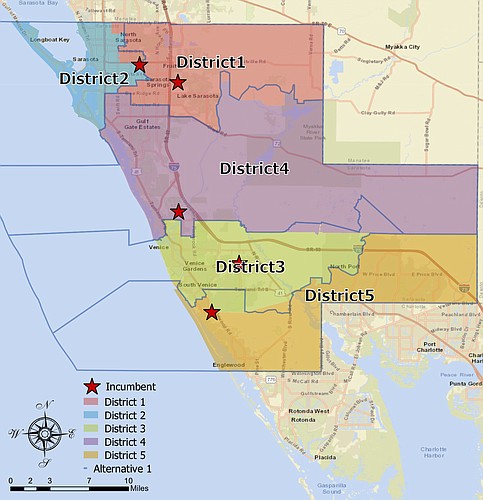- May 3, 2025
-
-
Loading

Loading

During the process of considering new district maps for county elections Tuesday, the County Commission defended its controversial decision to redistrict ahead of the 2020 census and criticized the single-member district election system, which voters approved in 2018.
At a special meeting Monday, the commission selected four maps for further consideration as the board works to redistrict before the end of the year. Two of those maps are based on a proposal from Kurt Spitzer, the county’s consultant on redistricting, while the other two were submitted online by resident Brian Goodrich.
The county is redistricting because, per 2020 census data, there’s too large a population gap between the largest and smallest district in the map adopted in 2019. Spitzer said a map is generally considered compliant with state and federal regulations if there’s a deviation of less than 10%, and the county map shows a deviation of more than 14% between District 2 in north Sarasota and District 3 in the southern end of the county.
Although the county received 11 submissions from residents, the commission dismissed all but two submissions. Board members expressed a variety of reasons for rejecting resident submissions, with the most frequent being improperly balanced districts and boundaries that drew a sitting commissioner out of the district they represented.
Spitzer said he drew his proposal for new district boundaries in an effort to create adequate balance while still largely maintaining the 2019 map. Under Spitzer’s map, portions of District 2 north of 12th Street and east of U.S. 301 would be incorporated into District 1. The County Commission asked Spitzer to create an alternate version of his proposed map that would establish State Road 72 as the southern boundary of District 1.
Goodrich’s maps propose a more significant deviation from the current district boundaries. The first map adjusts the eastern and southern boundaries of District 2 while splitting most of the current District 4 into two separate districts, with Interstate 75 serving as the dividing line.
In the second map, the current District 2 is redrawn to incorporate Longboat Key, a portion of the city of Sarasota and segments of the unincorporated county both west and east of I-75. District 1 would include a chunk of north Sarasota and a large swath of the middle of the county east of I-75 and south of State Road 72.
The county intends to finalize the maps it will consider for adoption at the Oct. 26 commission meeting.
Commissioner Mike Moran said the only reason the county had to redistrict was because of the switch to single-member districts following the 2018 election. Previously, voters countywide elected all five county commissioners, diminishing the importance of balanced districts. In 2018, however, 59.9% of the electorate supported a charter amendment creating single-member districts — which meant only residents within a district would vote to decide their representative.
Although supporters of the 2018 referendum expressed hope that it would make commissioners more responsive to their constituents, the County Commission has expressed disdain for the change. On Tuesday, Moran called the referendum the product of a “small group of sly Democrat operatives” brought about to increase the odds of a Democratic Party victory in a County Commission race for the first time since 1966.
The nonpartisan Sarasota Alliance for Fair Elections led the petition campaign to get the single-member district referendum on the ballot, though the Sarasota County Democratic Party supported the proposal.
Commissioner Christian Ziegler said he didn’t think the change was well thought out.
“If single-member districts didn’t exist, we wouldn’t even be mandated to do these gymnastics,” Moran said.
Supporters of single-member districts have organized in opposition to the county’s consideration of a referendum repealing the 2018 charter amendment. Ahead of a discussion at Wednesday’s Charter Review Board meeting, resident Dan Lobeck cited the county’s 2021 resident survey, in which 40% of respondents indicated a positive sentiment about single-member districts and 26% said they disapproved.
“Voters knew what they were doing in approving single-member districts by a 60% vote in 2018, on a very simple and clearly worded ballot,” Lobeck said in an email Tuesday. “There is no basis to say otherwise, and it is an insult to the voters to tell us we made a mistake.”